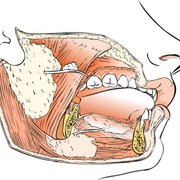 Photo: Getty Images
Photo: Getty Images
Salivary glands are so important to our oral health that overlooking our oral hygiene, and in turn, our salivary glands, can have a very detrimental impact on our overall wellbeing.
There are actually three pairs of these glands, known as major salivary glands. The two largest are known as the parotid glands. There is one gland in each of your cheeks, located in front of your ears, over the jaw.
Next come the submandibular glands. These are located on either side of your jaw, at the back of your mouth.
Finally, there are two glands under the floor of your mouth. These are called sublingual glands. Ducts open in your mouth at various points, allowing all six glands to empty saliva through the ducts and into your mouth.
Any time there is inflammation of one or more of the largest glands, the infection is called parotitis, or parotiditis. Another name for these infections is sialadenitis.
Why do these glands become infected? Certain viruses can cause salivary gland infections, and one that had caused this more often in the past was mumps. However, since many people are immunized against mumps these days, this causes is less common than it once was.
Bacteria can also lead to salivary gland infections. Particularly if there is a blockage in the gland, from either a salivary duct stone or, more commonly, as a result of poor oral hygiene or sometimes from dehydration.
The symptoms of salivary gland infections include:
• dry mouth
• foul or unusual tastes
• trouble opening your mouth
• fever
• facial or targeted mouth pain
• swelling in the areas where your glands are located, like in front of your ears, on the floor of your mouth and below your jaw
In order to determine how serious the infection is, a medical professional may order an ultrasound or a CT scan to see if there is an abscess. A CT scan or ultrasound may be done if the doctor suspects an abscess. If there is in fact an abscess, the treatment may include aspiration or even surgery.
The treatment of salivary gland infections depends on the infection itself. For example, for infections in which there is also pus or fever, if it is caused by bacteria, the treatment is often an antibiotic. However, if the infection is caused by a virus, antibiotics will not help.
In some cases, the salivary gland infection will go away on its own. Some easy home remedies include warm salt water rinses (1/2 teaspoon of salt in 1 cup of water). These may help reduce inflammation and clean out the area, as well as just provide relief from pain and discomfort. Also making sure to drink a lot of water, massaging the gland with heat, and using sugar-free lemon drops can increase the flow of saliva to reduce swelling.
In order to help prevent salivary gland infections, make a habit of practicing excellent and thorough oral hygiene. Flossing and brushing can go a long way toward maintaining the healthy state of your mouth in all ways -- teeth, gums and salivary glands as well.
While most salivary gland infections are not complicated or serious, there are exceptions. Some complications include the returning of the infection, abscess, or spread of infection becoming cellulitis or Ludwig’s angina.
While not all salivary gland infections can be prevented, practicing excellent oral hygiene can help avoid them. Don’t hesitate to contact your healthcare provider if you experience any symptoms of salivary gland infections, particularly if you have trouble breathing or swallowing, as these may indicate a health emergency.
Sources:
The New York Times Health Guide. Salivary Gland Infections. Retrieved from the internet on November 13, 2011.
http://health.nytimes.com/health/guides/disease/salivary-gland-infections/overview.html
MedLine Plus Medical Encyclopedia. Salivary Gland Infections
Retrieved from the internet on November 13, 2011
http://www.nlm.nih.gov/medlineplus/ency/article/001041.htm
Aimee Boyle is a regular contributor to EmpowHER
Review November 15, 2011
by Michele Blacksberg RN
Edited by Jody Smith




Add a CommentComments
There are no comments yet. Be the first one and get the conversation started!